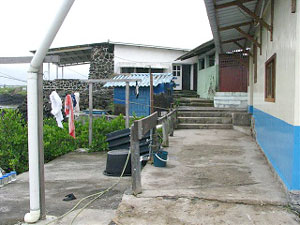

 | |||||||||||
|
|
Journals 2008/2009Tom Bogard
September 3, 2008 After breakfast I walked to Dr Deem's lab to help her prepare Penguin blood samples for shipment back to the United States for further analysis and testing for the Plasmodium parasite that causes avian malaria. These samples are considered a biohazard and must be prepared very carefully for international transport. Avian malaria was first found in several Galapagos Penguins in June of 2008. The malarial parasite requires a mosquito vector to infect the penguins and complete its life cycle. Avian malaria has infected and killed large numbers of penguins in United States zoos. To obtain the samples penguins were captured, blood was taken from a wing vein, and the birds were released unharmed. The purpose of the work is to understand the impact of the disease on penguins and to control its spread. Once the samples are received in the United States they will be further divided and sent to several different labs for testing. I spoke to Gustavo today about last minute details concerning tomorrow night's departure. It looks like we will be loading the boat at 2:30 and should be leaving port around 10:00 p.m. In our conversation I brought up my impressions of the people of the islands. Everyone that I had met was friendly, outgoing and easygoing. Gustavo said that my impressions were for the most part correct, but that the island people are not that same as those on the mainland. He said that the mainland people are more focused and business-like and in general not as outgoing. To me it is amazing how quickly I became accustomed to my surroundings. What at first seemed very foreign to me now seems regular and commonplace. I do not believe that I would have any trouble living here. My biggest regret has been that I do not know more Spanish. Not just for the basic communication, but also the nuance of a culture is in the language and I feel that I am missing that piece. Breakfast and lunch have been in the Station's cafeteria (they do not serve dinner). The food has been very good. Breakfast is always eggs with cheese, fresh tropical fruit, warm roll with butter and coffee. Lunch is meat (chicken, pork, beef, fish) always with rice and vegetables, and a small dessert. There is no ordering; you come in sit down and you are served whatever they are cooking. The cafeteria is right on the water and has a great view of the harbor.
|
||||||||||

